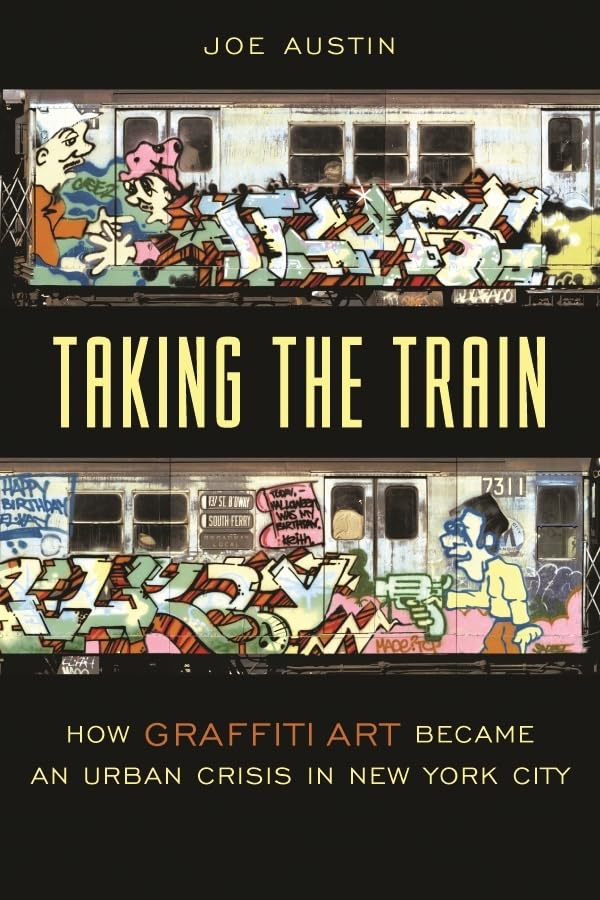
Title

Taking the Train,New
Delivery time: 8-12 business days (International)
In the 1960s and early 1970s, young people in New York City radically altered the tradition of writing their initials on neighborhood walls. Influenced by the widespread use of famous names on billboards, in neon, in magazines, newspapers, and typographies from advertising and comics, city youth created a new form of expression built around elaborately designed names and initials displayed on public walls, vehicles, and subways. Critics called it 'graffiti,' but to the practitioners it was 'writing.'Taking the Train traces the history of 'writing' in New York City against the backdrop of the struggle that developed between the city and the writers. Austin tracks the ways in which 'writing' a small, seemingly insignificant act of youthful rebellionassumed crisislevel importance inside the bureaucracy and the public relations of New York City mayoral administrations and the Metropolitan Transportation Authority for almost two decades. Taking the Train reveals why a global city short on funds made 'wiping out graffiti' an expensive priority while other needs went unfunded. Although the city eventually took back the trains, Austin eloquently shows how and why the culture of 'writing' survived to become an international art movement and a vital part of hiphop culture.
By changing our most important processes and
products, we have already made a big leap forward. This ranges from the
increased use of more sustainable fibers to the use of more
environmentally friendly printing processes to the development of
efficient waste management in our value chain.
⚠️ WARNING (California Proposition 65):
This product may contain chemicals known to the State of California to cause cancer, birth defects, or other reproductive harm.
For more information, please visit www.P65Warnings.ca.gov.
Shipping & Returns
Shipping
We ship your order within 2–3 business days for USA deliveries and 5–8 business days for international shipments. Once your package has been dispatched from our warehouse, you'll receive an email confirmation with a tracking number, allowing you to track the status of your delivery.
Returns
To facilitate a smooth return process, a Return Authorization (RA) Number is required for all returns. Returns without a valid RA number will be declined and may incur additional fees. You can request an RA number within 15 days of the original delivery date. For more details, please refer to our Return & Refund Policy page.
Shipping & Returns
Shipping
We ship your order within 2–3 business days for USA deliveries and 5–8 business days for international shipments. Once your package has been dispatched from our warehouse, you'll receive an email confirmation with a tracking number, allowing you to track the status of your delivery.
Returns
To facilitate a smooth return process, a Return Authorization (RA) Number is required for all returns. Returns without a valid RA number will be declined and may incur additional fees. You can request an RA number within 15 days of the original delivery date. For more details, please refer to our Return & Refund Policy page.
Warranty
We provide a 2-year limited warranty, from the date of purchase for all our products.
If you believe you have received a defective product, or are experiencing any problems with your product, please contact us.
This warranty strictly does not cover damages that arose from negligence, misuse, wear and tear, or not in accordance with product instructions (dropping the product, etc.).
Warranty
We provide a 2-year limited warranty, from the date of purchase for all our products.
If you believe you have received a defective product, or are experiencing any problems with your product, please contact us.
This warranty strictly does not cover damages that arose from negligence, misuse, wear and tear, or not in accordance with product instructions (dropping the product, etc.).
Secure Payment
Your payment information is processed securely. We do not store credit card details nor have access to your credit card information.
We accept payments with :
Visa, MasterCard, American Express, Paypal, Shopify Payments, Shop Pay and more.
Secure Payment
Your payment information is processed securely. We do not store credit card details nor have access to your credit card information.
We accept payments with :
Visa, MasterCard, American Express, Paypal, Shopify Payments, Shop Pay and more.
Related Products
You may also like
Frequently Asked Questions
- Q: What is the primary theme of 'Taking the Train'? A: 'Taking the Train' explores the history of graffiti, or 'writing', in New York City during the 1960s and 1970s, highlighting its significance as a form of youthful expression and rebellion.
- Q: Who is the author of the book? A: The author of 'Taking the Train' is Joe Austin.
- Q: What is the publication date of 'Taking the Train'? A: 'Taking the Train' was published on August 15, 2001.
- Q: What type of binding does 'Taking the Train' have? A: 'Taking the Train' is available in paperback binding.
- Q: How many pages are in 'Taking the Train'? A: 'Taking the Train' contains 400 pages.
- Q: What is the condition of the book when purchased? A: The book is sold in new condition.
- Q: In which category is 'Taking the Train' classified? A: 'Taking the Train' is classified under the History category.
- Q: Is there any specific material used for the book's cover? A: The product details do not specify a particular material for the book's cover.
- Q: What makes 'Taking the Train' significant in contemporary culture? A: 'Taking the Train' is significant because it discusses how graffiti evolved into an international art movement and its integral role in hip-hop culture.
- Q: Does 'Taking the Train' address the conflict between graffiti artists and city authorities? A: Yes, 'Taking the Train' details the ongoing struggle between graffiti writers and New York City authorities, highlighting the city's efforts to eradicate graffiti.
